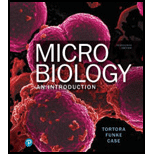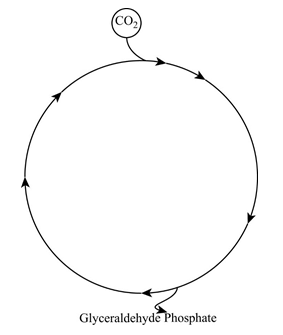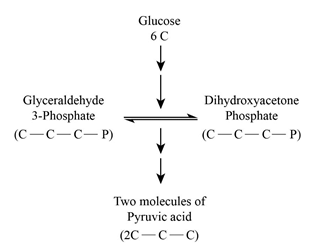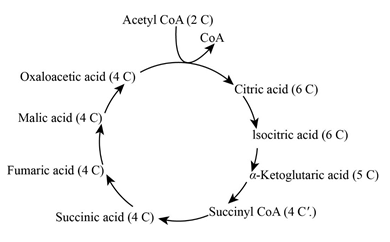
Concept explainers
To name:
The pathways diagrammed in parts (a), (b), and (c) of the given figure.
Introduction:
Cellular mechanisms involved in many reactions in which the transfer of electrons from one molecule to another take place by means of
Explanation of Solution
- The given diagram is the Calvin-Benson cycle. In this cycle, three molecules of carbon dioxide are fixed and one molecule of glyceraldehyde 3-phosphate is produced. After that, it leaves the cycle is shown in the below diagram.
- The given b diagram resembles the Glycolysis pathway. In this pathway, the oxidation of glucose yields two molecules of pyruvic acid as its end product.
- The below-given diagram is the Kreb’s cycle. Here, the decarboxylation of pyruvic acid produces one carbon dioxide molecule and one acetyl group.



To review:
The anabolic and catabolic mechanisms in the given pathways.
Introduction:
The cellular mechanism of all living organisms requires the energy for its
Explanation of Solution
Glycolysis and the Citric acid cycle are the major pathways for anabolic and catabolic mechanisms of all organic molecules, such as carbohydrates, lipids, and proteins. Glycerol is catabolized as Dihydroxyacetone phosphate in the Glycolysis pathway (a) and fatty acids are catabolized as acetyl CoA int he TCA cycle (b).
Glutamic acid is catabolized in the Krebs cycle (c). Glutamic acid is an amino acid which is catabolized by Kreb’s cycle at α-ketoglutaric acid which is formed from isocitric acid.
In the Calvin-Benson cycle, Glyceraldehyde 3-phosphate is the end product, which enters into glycolysis. In glycolysis, the glucose is oxidized into pyruvate which is decarboxylated to acetyl group and entered into the Kreb’s cycle.
The Calvin cycle requires 18 molecules of ATP between glucose and glyceraldehyde 3- phosphate.
Three molecules of carbon dioxide (CO2) is released in the Kreb’s cycle,
- Between pyruvate to acetyl CoA.
- Between isocitric acid to α-ketoglutarate (TCA cycle).
- Between α-ketoglutarate to succinyl CoA.
The long chain hydrocarbon like such as acetyl group is catabolized in the TCA cycle at acetyl CoA. This acetyl group like hydrocarbons are catabolized by beta-oxidation which enters into the Kreb’s cycle.
The production of NADH, FADH2 or NADH in glycolysis, Calvin-Benson and TCA cycles are,
The anabolic and catabolic pathways are integrated between,
- In glycolysis, the anabolic and catabolic pathways integrated into dihydroxyacetone phosphate.
- In the TCA cycle, the anabolic and catabolic pathways integrated into acetyl, oxaloacetic acid and ketoglutaric acid.
| Utilizes | Produces | |
| Glycolysis | 2 NADH | |
| Calvin-Benson cycle | 6 NADPH | |
| Pyruvate to acetyl CoA | 1 NADH | |
| Isocitrate to α-ketoglutaric acid | 1 NADH | |
| α-keto-glutaric to succinyl CoA | 1 NADH | |
| Succinate to fumarate | 1 FADH2 | |
| Malate to oxalate | 1 NADH |
Want to see more full solutions like this?
Chapter 5 Solutions
Microbiology: An Introduction Plus Mastering Microbiology with Pearson eText -- Access Card Package (13th Edition) (What's New in Microbiology)
- 1. Color the line that represents all ancestors of the Eastern white pine tree green (but only the ancestral line NOT shared with other organisms) 2. Oncle the last common ancestor of the Colorado blue spruce tree and Eastern white pine tree. 3. Put a box around the last common ancestor of the sugar maple tree and the dogwood tree. 4. Put a triangle around the last common ancestor of the red pine tree and the american holly bush. 5. Color the line that represents all ancestors of the Ponderosa pine tree red (including all shared ancestors). 6. Color the line that represents all ancestors of the American elm tree blue (including all shared ancestors). 7 Color the line that represents all ancestors of the Sabal palm tree purple (including all shared ancestors) 8. Using a yellow highlighter or colored pencil, circle the clade that includes all pine trees. 9. Using a orange highlighter or colored pencil, circle the clade that includes all gymnosperms 10. Can you tell…arrow_forwardYou have been hired as a public relations specialist to give invertebrates a good name. After all, they are much more than just creepy crawly bugs! Your first task though is to convince yourself that is true. The best way to do that is to start close to home. Find something in your house that is a product obtained directly from an invertebrate or only due to an invertebrate’s actions. Describe the product, its function and utility, as well as any human manufactured alternatives. Be sure to highlight the advantages of obtaining this directly from nature. Keep in mind, a product can be something you use, wear, eat, or enjoy for its visual appeal.arrow_forwardUse the following tree diagram to answer Questions #8-10. 8) Which of the following two animals are the most closely related based on the tree to the left? a) Pig and camel b) Hippo and pig c) Deer and cow 9) CIRCLE on the tree diagram where the common ancestor between a hippo and a cow is. 10) Put a SQUARE on the tree diagram where the common ancestor between a pig and a peccary is.arrow_forward
- Explain: Healthy Cell Function Overview→ Briefly describe how a healthy cell usually works: metabolism (ATP production), pH balance, glycogen storage, ion transport, enzymes, etc. Gene Mutation and Genetics Part→ Focus on the autosomal recessive mutation and explain: How gene mutation affects the cell. How autosomal inheritance works. Compare the normal and mutated gene sequences simply. → Talk about possible consequences of a faulty hydrolytic enzyme.arrow_forwardCan you fill out those termsarrow_forwardExplain down bellow what happens to the cell: Decreased pH in mitochondria Increased ATP Decreased pH in cytosol Increased hydrolysis Decreasing glycogen and triglycerides Increased MAP kinase activity Poor ion transport → For each one:→ What normally happens?→ What is wrong now?→ How does it mess up the cell?arrow_forward
- An 1100 pound equine patient was given 20 mg/kg sucralfate 3 times a day, 2.8 mg/kg famotidine twice a day, and 10mg/kg doxycycline twice a day. Sucralfate comes as a 1 gm tablet, famotidine as 20 mg tablets, and doxycycline as 100mg tablets. All are in bottles of 100 tablets.How many total mg are needed for the patient and how many tablets of each would be needed to provide each dose?How many bottles of each would be needed to have available if this patient were to be on this drug regimen for 5 days?arrow_forwardThe patient needs a solution of 2.5% dextrose in Lactated Ringer’s solution to run at 75 ml/hr for at least the next 12hours. LRS comes in fluid bags of 500 ml, 1 Liter, 3 Liters and 5 Liters. How can a 2.5% solution be made by adding50% dextrose to the LRS?arrow_forward“Gretchen” was a 68-pound canine who came to the VMTH as small animal surgery patient. She receivedacepromazine, 0.2 mg/kg from a 10 mg/ml solution and oxymorphone, 0.08 mg/kg from a 1 mg/ml solution before surgery.What are the mechanisms of action of acepromazine and oxymorphone? Why would they be given together?How many mg provide each dose and how many ml of each of these solutions were given?arrow_forward
- After surgery, “Gretchen” was put on carprofen, 1 mg/pound bid (twice a day). The tablets come in 25, 75 and 100 mgsizes. Which size tablet would be appropriate?What is the mechanism of action of carprofen?An outpatient prescription was written for her so she would have enough for 10 days. How many tablets did she need?What information needs to be on her out-patient prescription?arrow_forwardJoden Koepp olor in chickens is due to incomplete dominance. BB = Black chicken, WW = White BLOOD TYPES Arhite chicken is In humans, Rh positive blood is dominant (R) over Rh negative blood (r). A man with type 0, Rh positive blood (whose mother had Rh negative blood), marries a woman with type AB, Rh negative blood. Several children were born. is? R R Genotypes Phenotypes RRR RR Rr Rr 4/16 RR R RR RK Rr Rr 4/16 rr 3/4 Rh posi 1/4 Rh negu 1/2 Rr rr rr rrrr 88 888 75 e genotype of the man? the genotype of the woman? The mother of the man had type AB blood.arrow_forwardPlease indentify the unknown organismarrow_forward
 Human Heredity: Principles and Issues (MindTap Co...BiologyISBN:9781305251052Author:Michael CummingsPublisher:Cengage Learning
Human Heredity: Principles and Issues (MindTap Co...BiologyISBN:9781305251052Author:Michael CummingsPublisher:Cengage Learning Concepts of BiologyBiologyISBN:9781938168116Author:Samantha Fowler, Rebecca Roush, James WisePublisher:OpenStax College
Concepts of BiologyBiologyISBN:9781938168116Author:Samantha Fowler, Rebecca Roush, James WisePublisher:OpenStax College





